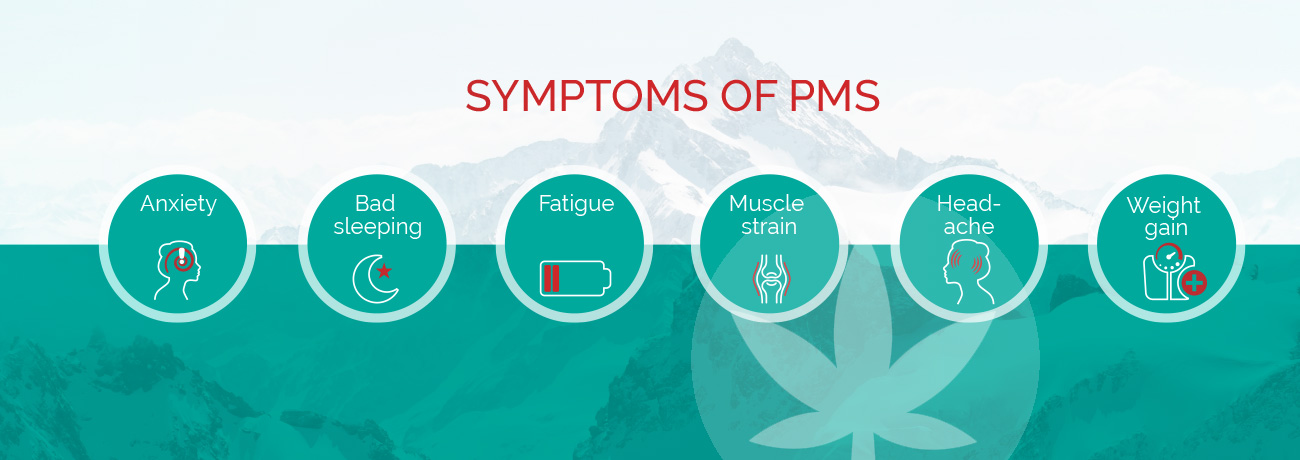CBD and Premenstrual Syndrome (PMS)
Last updated:
Published:
PMS can be unrelenting and unforgiving
Mood swings, cramps, fatigue, irritability, and in some cases, depression—these symptoms are just a handful of what women have to deal with during every menstrual cycle. The most challenging aspect of premenstrual syndrome (PMS) is that no two cases are the same. While there are generalised symptoms, many women experience some, none, or all of the symptoms listed above.
The breadth of possible symptoms not only makes the lives of millions of women a monthly struggle, but physicians and doctors have an equally tricky time prescribing the right course of treatment. When it comes to treating a wide range of symptoms, a broader strategy may help, instead of trying to tackle each one individually.
To that end, many medical bodies recommend small changes to diet, exercise, a restful night's sleep, and relaxation therapy as a means of managing or reducing the symptoms of PMS. But what about CBD? Before we explore the potential role of this cannabinoid for women with PMS, it helps to understand what exactly the body is going through.
What is premenstrual syndrome (PMS)?
Premenstrual syndrome (also known as premenstrual tension; PMT) occurs a few to several days before a woman gets her monthly period. Although the exact cause of PMS remains unknown, it’s believed to be triggered by increased levels of the hormone progesterone. Physical symptoms can manifest as fatigue, bloating, weight gain, breast tenderness, outbreaks of acne, and insomnia or appetite changes.
Psychologically, PMS is just as troublesome. It is common for women to experience irritability, anxiety, mood swings, or depression, albeit temporarily. Most symptoms subside entirely at the end of menstruation. It is, however, possible for symptoms to vary from cycle to cycle, and to change with age. While the breadth of symptoms paints a grim picture, fortunately, many women’s symptoms are mild, having a minor impact on everyday life.
In rare cases, symptoms of PMS can escalate, causing debilitating discomfort. Approximately 20–40% of all women will experience severe PMS symptoms, while 3–8% are diagnosed with significant impairment to mental health (premenstrual dysphoric disorder; PMDD).
If you’ve been affected by severe PMS, then you’ll need little reminding of how frustrating it is. Many women feel as though they are losing control over their body and emotions, further compounding what is already a challenging time. The lack of known cause and significant absence of scientific research make treatment of PMS challenging, to say the least.

Could CBD help with PMS?
With the sheer breadth of possible symptoms covered, it’s time to find out what role CBD could potentially play according to a range of preliminary studies. However, it’s crucial to point out that CBD is not believed to target PMS specifically. Instead, the cannabinoid may direct its efforts toward the condition’s physical and emotional symptoms. Moreover, research in this area is still extremely limited.
Unfortunately, both depression and anxiety are frequent psychological symptoms associated with PMS. Preliminary results from human trials on social anxiety disorder indicate that CBD may have some potential in this arena, while studies on animal models suggest an antidepressant-like action from the cannabinoid.
Sleep is essential for keeping ourselves grounded, both physically and mentally. Insomnia experienced during PMS puts women under incredible strain. In a study performed by the University of São Paulo, rats were administered with CBD to detect the cannabinoid’s impact on the sleep-wake cycle. It was found that mild doses of CBD (10–40mg) significantly increased the total percentage of sleep while also increasing alertness during the day.
One of the most common symptoms of PMS is painful menstrual cramps. According to the Pain Research and Management Centers= at the University of Utah, the endocannabinoid system has demonstrated a “significant interface with pain homeostasis”. CBD and the maintenance of the ECS appear to go hand in hand. A review published in Trends In Pharmacological Sciences found that the compound may improve cannabinoid receptor activation and promote the production of beneficial endocannabinoids.
Treatment for PMS is still incredibly case-specific
The sheer volume and fluidity of PMS symptoms means there is no silver bullet treatment. Alongside common prescriptions of antidepressants, NSAIDs, and hormonal contraceptives, women may find that simple changes to diet or lifestyle are enough to make PMS symptoms manageable.
The preliminary studies outlined above appear to suggest that CBD may support the management of several of the psychological and physical symptoms of PMS. However, research is still in its infancy, not only in regards to CBD, but concerning PMS overall. Any treatment should be reviewed on a case-by-case basis, and as such, your doctor should always be the first port of call—whether you want to use CBD or not. Given the relative safety of CBD, a characteristic endorsed by the WHO, the hope is that future research will provide a definitive answer.














